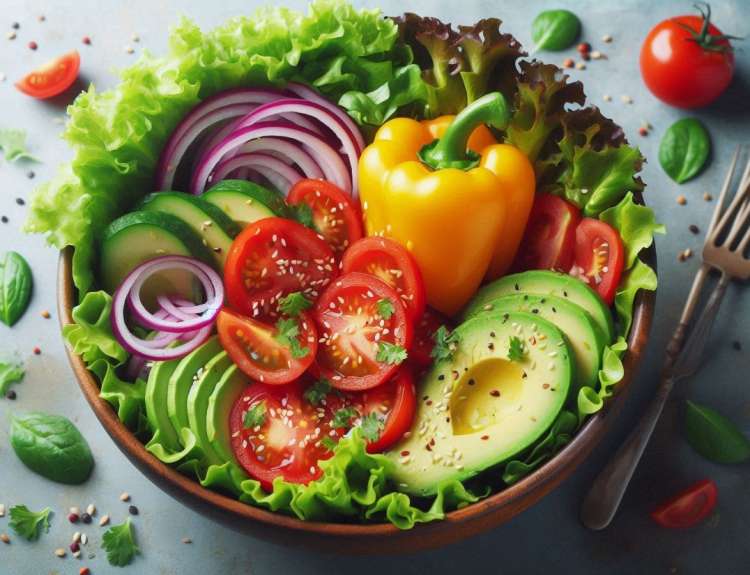What comes to mind when you hear the words “healthy food”? Is it boiling greens, kale salads, or just a long list of guidelines and limitations? Let’s have a discussion.
Introduction to Healthy Food
Nutritious cuisine is about fueling your body, mind, and spirit with colorful, nutrient-dense choices—it’s not about flavorless meals or rigid regimens. It’s similar to a relationship that you build; the more you give it, the more you gain from it!
What is Healthy Food?
So what precisely qualifies as “healthy” food? It all comes down to the nutrients that are contained in the food that you eat. Fruits, vegetables, lean meats, complete grains, and healthy fats are generally found in nutritious food. It all comes down to finding balance and making sure your food properly fuels your body.
Importance of Eating Healthy
Healthy eating is a fundamental lifestyle choice that will help you thrive, not just a catchphrase. It just runs better, so compare it to adding premium fuel to a high-performance vehicle. In our case, eating well increases vitality, elevates mood, and promotes general health. Having a positive body image can significantly improve your everyday existence, and who wouldn’t want a little more of that?
Nutritional Basics
Macronutrients: Proteins, Carbohydrates, Fats
Let’s dissect the fundamentals! The major players in the field of nutrition are macronutrients. These are the significant amounts of proteins, carbohydrates, and lipids that your body requires.
- Proteins: The building blocks of your body are these! Consider fish, meat, beans, and nuts. They produce hormones and enzymes and aid in tissue repair.
- Glucose: Carbohydrates, like gas for your car, are frequently misunderstood. Seek for fruits, vegetables, and whole grains that break down slowly and provide you with a steady supply of energy.
- Fats: Not all fat is made equally! Good fats, such as those in nuts, avocados, and olive oil, are crucial for hormone production and the health of the brain.
Micronutrients: Vitamins and Minerals
These tiny miracles are vitamins and minerals, which are essential even though we only require minimal amounts of them. Micronutrients, which range from calcium in yogurt to vitamin C in oranges, support essential body processes, bolster immunity, and maintain healthy, radiant skin.
The Benefits of Healthy Eating
Physical Health
Do you want to avoid developing heart problems, diabetes, or obesity? Eating well can be your best line of protection! A well-balanced diet boosts immunity, promotes general health, and aids in maintaining a healthy weight.
Mental Well-Being
Unbelievably, your mood can be influenced by the food you consume! Foods high in nutrients, such as fatty fish and leafy greens, can enhance cognitive function and lessen anxiety. Consider it as providing your brain with a healthy diet that improves mental clarity.
Long-Term Health Advantages
Eating well is an investment since the foods you choose to eat now can affect your health in the future. Not only will a nutrient-dense diet provide you with more energy right away, but it will also improve your chances of having a healthy future.
Core Components of a Healthy Diet
Fruits and Vegetables
These colorful pals are who you are! Try to fill your plate as much as possible; greater variety equals more nutrition. Toss in some spinach and berries, and you’re off to a tasty and nutritious start.
Whole Grains
Make the switch from white to whole grain bread, and your health will thank you! Fiber from whole grains keeps you feeling full and helps with digestion.
Lean Proteins
Fish, poultry, beans, and poultry all stave off hunger and provide energy for your muscles. They prolong your feeling of fullness and aid in your body’s healing processes.
Healthy Fats
Prepare to love nuts and avocados! Good fats support heart health and nutrient absorption. As long as it’s prepared with healthy ingredients, you can enjoy pizza and eat a balanced diet!
Planning a Healthy Meal
Meal Prepping Tips
Do you want to cut down on time? Organizing your meals can help! Allocate many hours every week for chopping vegetables, cooking grains, and dividing up proteins. It’s similar to arranging your meals so that wholesome selections are constantly accessible.
Portion Control
Ask yourself honestly: Are you serving yourself more food than you require? We tend to pile too much on our plates. A decent rule of thumb is to put half of your plate in vegetables, 25% in protein, and 25% in whole grains.
Balancing Flavor and Nutrition
Nutritious cuisine doesn’t have to be boring! Use your imagination! To enhance flavor without adding extra calories, use herbs and spices. Play around and explore different flavors—cooking should be a fun rather than a work!
Shopping for Healthy Food
Reading Labels Effectively
The next time you go food shopping, learn to read labels. Examine the ingredients; the shorter the better; also, look for bad fats and added sugars.
Budgeting for Healthy Meals
Maintaining a healthy diet doesn’t have to be expensive. When feasible, try to shop in bulk and center your meal plans around what’s in season or on sale.
Seasonal Produce Choices
Why not benefit from locally grown, fresh produce? Not only do seasonal foods taste better, but they’re also usually less expensive! You may make the best friends at farmer’s markets.
Myth Busting: Common Misconceptions about Healthy Food
“Healthy Food is Always Expensive”
This is not at all how it is! Getting wise about your shopping can dispel this myth. Legumes, cereals, and fresh produce can make affordable substitutes!
“All Fats are Bad”
Now hold on, this is untrue! Although trans fats are dangerous, good fats are necessary for proper food absorption and brain function.
“Carbohydrates Should Be Avoided”
Carbs are essential! They supply fiber and energy. The key is to choose the correct kinds; whole grains are always preferable than processed carbohydrates.
Creative Ways to Incorporate Healthy Foods into Your Diet
Smoothies and Juices
Have you had a hectic morning? Make a smoothie with your favorite fruits and vegetables. Simple, simple, and incredibly nourishing—like a delectable health hug in a cup!
Substitutions for Common Ingredients
Do you want your go-to dishes to be healthier? Try zucchini noodles in place of pasta or Greek yogurt in place of sour cream. It all comes down to flipping those wise switches.
Exploring International Cuisines
Taste cuisines from many nations to broaden your palate and learn about unusual, tasty, and healthful ingredients. You can make exploring food your pastime!
Maintaining a Healthy Lifestyle
Exercise and Nutrition Balance
Remember the other half: exercise! Regular exercise combined with a healthy diet improves your health outcomes.
Staying Hydrated
Water is really important! To stay hydrated and support healthy bodily functions, make sure you drink enough water throughout the day. Furthermore, humans occasionally confuse thirst with hunger!
Mindful Eating Practices
Give your meal a genuine moment of enjoyment. Enjoy each and every bite! This can assist you in appreciating the food and determining when you’re full.
Conclusion
Eating well is only one aspect of healthy eating; another is adopting a lifestyle. It’s about choosing decisions that support your wellbeing, experiencing life to the fullest, and indulging in mouthwatering, healthy meals. Consuming a diet rich in color and variety primes your body for prosperity, longevity, and happiness. So why hold off? The path to eating a better diet begins right now!
FAQs
What simple, healthful snacks are there?
Excellent query! Simple, healthful snacks are raw vegetables with hummus, yogurt with berries, and sliced fruits with nut butter.
On a tight budget, how can I begin eating healthily?
Begin by cooking at home, selecting seasonal vegetables, and organizing your meals around deals. Consider purchasing necessities like rice, beans, and canned items in quantity!
Which unhealthy meals are acceptable when consumed in moderation?
Of course! It’s okay to occasionally indulge in decadent cuisine. The issue is moderation; avoid starving yourself.
What should I consume to improve my health?
Water is king, but you can still stay healthy and have variety with herbal teas, smoothies, and fruit-infused water. Just be cautious around sugary beverages!
How can I continue eating in a healthy way?
Make a commitment to meal planning, stocking up on healthful options, and cultivating a happy outlook. Enjoy the process and have patience as change takes time!





